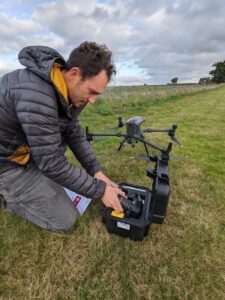 Space Park Leicester Launches Drone Equipped with AI for Spacecraft
Space Park Leicester Launches Drone Equipped with AI for Spacecraft
by DRONELIFE Staff Writer Ian M. Crosby
Space Park Leicester has announced the successful launch of a drone making use of revolutionary AI equipment for use in spacecraft. The equipment leverages an innovative design approach to enable AI algorithms to be dramatically reduced in size. The solution is suitable for embedded computing devices utilized in satellites, drones, autonomous driving and robotics, and has applications in cloud detection, disaster, flood, crop, and pollution monitoring alongside situational awareness, spacecraft anomaly detection and maritime surveillance.
Space Park Leicester’s Drone Lab is fully operational due to joint investment from the University of Leicester, Space Park Leicester, the National Centre for Earth Observation (NCEO) and the National Environment Research Council (NERC), and is prepared to support further ground-breaking projects going forward.
With funding from the Science and Technology Facilities Council, the project is led by Principal Investigator Professor Tanya Vladimirova from the University of Leicester’s School of Computing and Mathematical Science, with support from METEOR Principal Engineer Piyal Samara-Ratna and Space Park Leicester Software and Instrumentation Engineer Oliver Blake.
“The first flight of this project provided invaluable data to the development of a new high performance and lightweight framework for the use of artificial intelligence algorithms powered by high complexity neural networks, developed by Dr Tolga Turay, a member of my research team,” said Prof. Tanya Vladimirova.
 “This initial flight will lay the foundation for future flights. Each mission and deployment is an opportunity to learn and develop our methods to make flying a drone of this size safe and more efficient,” said Piyal Samara-Ratna. “Using drones to test space-based sensor systems and ideas may help reduce costs and the development time associated with using manned flight testing. Manned aircraft costs thousands, requires booking weeks, if not months, in advance and if the weather is adverse on the day of the flight the data gathered from deployment may be impacted negatively, resulting in additional flights being required.”
“This initial flight will lay the foundation for future flights. Each mission and deployment is an opportunity to learn and develop our methods to make flying a drone of this size safe and more efficient,” said Piyal Samara-Ratna. “Using drones to test space-based sensor systems and ideas may help reduce costs and the development time associated with using manned flight testing. Manned aircraft costs thousands, requires booking weeks, if not months, in advance and if the weather is adverse on the day of the flight the data gathered from deployment may be impacted negatively, resulting in additional flights being required.”
“Drones provide a unique capability. They fill the gap between ground based and air-based deployments of equipment,” said Dr Steven Lloyd, Drone Laboratory Coordinator. “So long as we have permission from landowners, we can fly drones when the weather conditions allow, reducing the risk to project timelines from multiple missed deployments from manned aircraft. This deployment was the first of its kind for the Drone Lab at Space Park Leicester, with more flights planned soon.”
“The drone lab project, funded by the Science and Technology Facilities Council, is now fully operational and is ready to support more amazing projects in the future,” added Co-Investigator Dr Joshua D. Vande Hey from the University of Leicester’s School of Physics and Astronomy.
“Access to the drone laboratory and engineering capabilities at Space Park Leicester is a fantastic resource to further and maximise the impact of my research,” said project participant Viktoria Afxentiou, whose PhD is with Professor Tanya Vladimirova.
The Space Park Leicester engineering team acknowledge and thank Gareth Bustin and Sittles Flyers Lichfield Airfield for their support in the drone flight campaign.
Read more:
- A Drone and Wearable Sensor Solution Locates Firefighters in a Burning Building: Research from George Mason University
- Researchers Help Underwater Drones Detect Ocean Contaminants, Like Oil Spills or Gas Leaks
- Skypersonic Drones on Mars? NASA’s Fascinating Simulated Mars Missions
- NASA and Zipline Sign Space Act Agreement to Pursue m:N Drone Operations

Miriam McNabb is the Editor-in-Chief of DRONELIFE and CEO of JobForDrones, a professional drone services marketplace, and a fascinated observer of the emerging drone industry and the regulatory environment for drones. Miriam has penned over 3,000 articles focused on the commercial drone space and is an international speaker and recognized figure in the industry. Miriam has a degree from the University of Chicago and over 20 years of experience in high tech sales and marketing for new technologies.
For drone industry consulting or writing, Email Miriam.
TWITTER:@spaldingbarker
Subscribe to DroneLife here.







[…] Can Drones Take a look at AI Designed for Spacecraft? Area Park Leicester’s Drone Lab […]